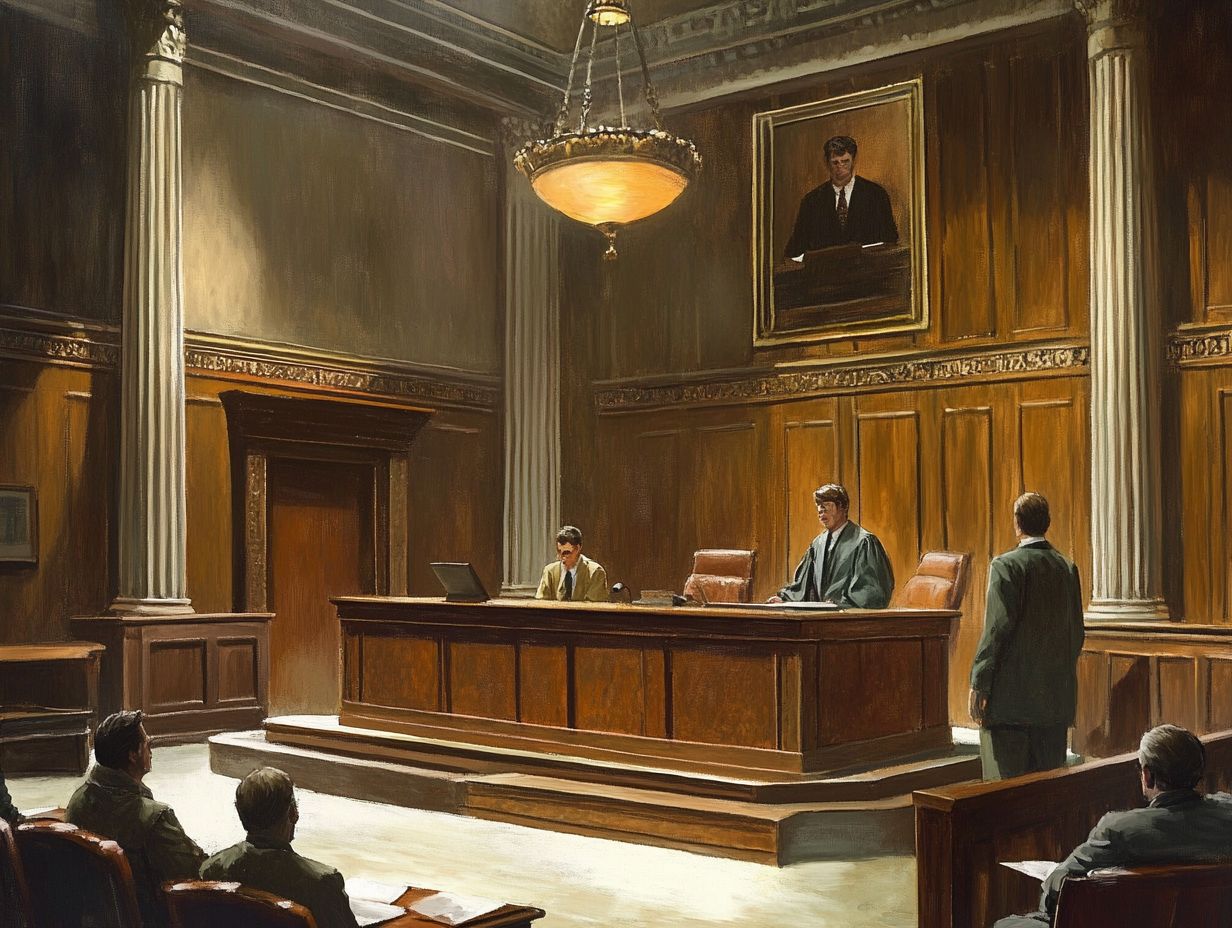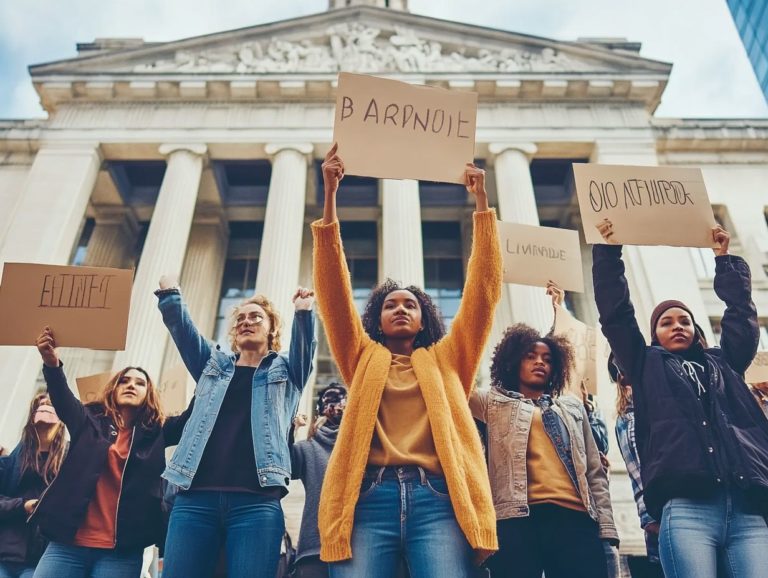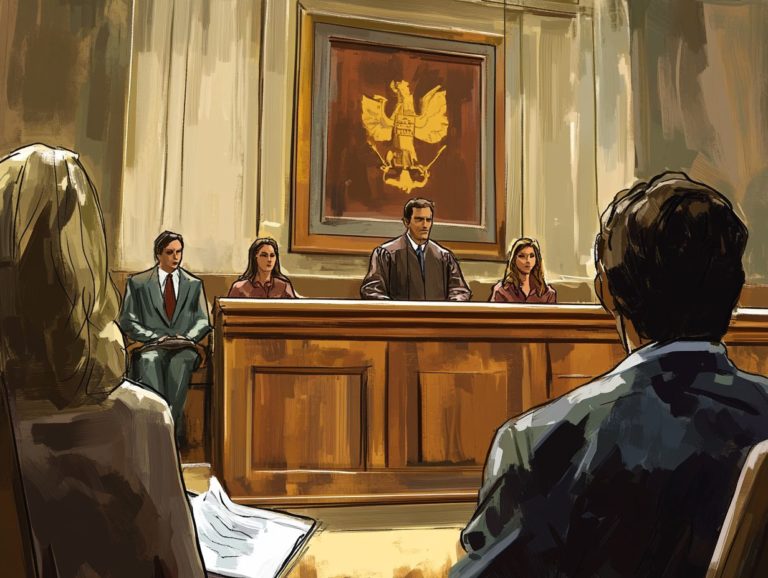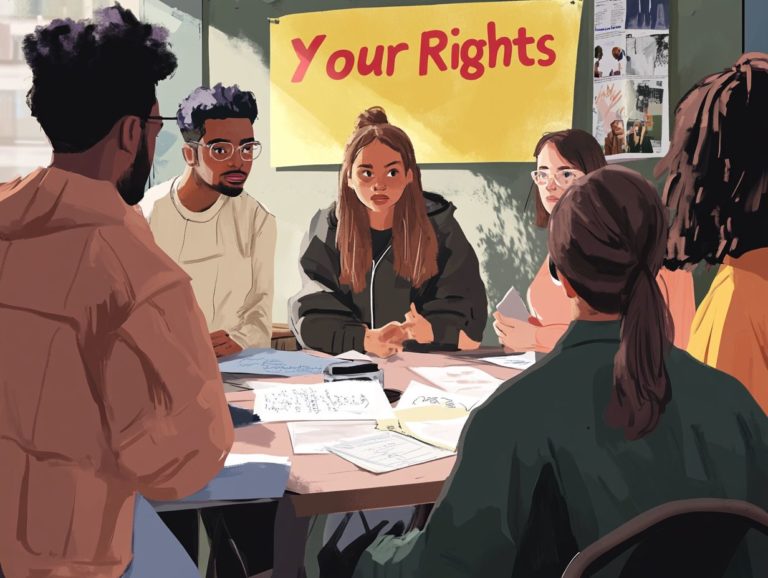The Right to Be Present at Your Trial
Your right to be present at trial is crucial! It ensures you can defend yourself effectively. This article explores the importance of this right, tracing its historical evolution and examining the exceptions where it may not apply. You ll gain insight into the potential consequences of waiving this right and learn how to assert it effectively.
We will also discuss the challenges and ongoing debates surrounding this fundamental legal principle, along with its future implications. Engage with us as we unpack this essential aspect of due process.
Contents
- Key Takeaways:
- The Importance of the Right to Be Present at Your Trial
- How This Right Has Developed Over Time
- Exceptions to the Right to Be Present
- Consequences of Not Exercising This Right
- How to Protect This Right
- Challenges and Controversies Surrounding This Right
- Future of the Right to Be Present at Trial
- Frequently Asked Questions
- What is the right to be present at your trial?
- Why is the right to be present at your trial important?
- Is the right to be present at your trial absolute?
- No, the right to be present at your trial is not absolute.
- When can my right to be present at my trial be given up?
- Can my lawyer represent me at trial if I am not there?
- What should I do if I am denied the right to be present at my trial?
Key Takeaways:
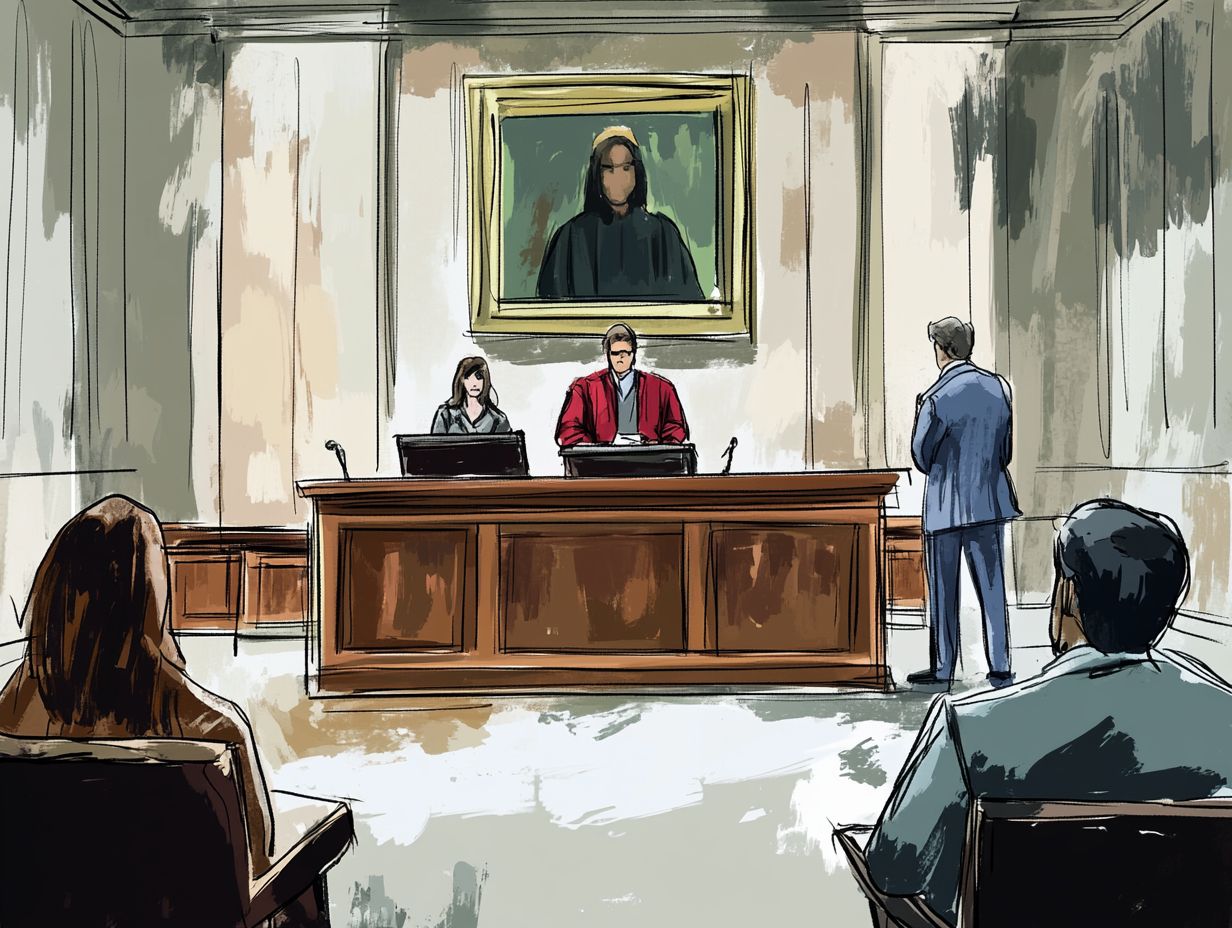
The right to be present at your trial is a fundamental component of a fair and just legal system.
This right has a long history and has evolved to protect the rights of the accused.
While there are exceptions to this right, not exercising it can have serious consequences on the fairness and due process of a trial.
The Importance of the Right to Be Present at Your Trial
The right to be present at your trial is a cornerstone of court processes. It highlights the essential role your participation plays in the legal process, including the right to present evidence in your defense.
This right is firmly established in various legal precedents. It serves as a vital safeguard for ensuring fair trials.
Being present helps you understand the proceedings. It allows you to confront witnesses and engage with your lawyer.
Courts consistently stress that your presence enhances the integrity of the trial and upholds your rights under the law.
Understanding the Significance of This Right
Understanding the significance of the right to make a statement in court means recognizing its vital role in upholding defendants’ rights. It ensures that judicial proceedings are fair and just.
Your presence at trial not only demonstrates your active participation in your own defense. It also acts as an essential pillar in maintaining the perception of justice within the courtroom.
When you are absent, the integrity of the judicial process can come under scrutiny. Your inability to confront evidence or actively engage in your defense undermines the very essence of a fair trial.
Being absent can lead to giving up important rights. This leaves you vulnerable to unfavorable outcomes without the chance to contest allegations or effectively challenge the prosecution s case.
For instance, there have been troubling instances where absent defendants were convicted based on hearsay. This raises significant concerns about the fairness and accountability of the legal system.
How This Right Has Developed Over Time
The history and evolution of the right to be present at trial unfolds through pivotal legal precedents and shifting interpretations of defendants’ rights, including the right to confront witnesses. This journey reflects the societal values and legal frameworks that have consistently prioritized fair judicial processes.
From the early tenets of common law to contemporary statutory provisions, this right has experienced significant transformation. By diving into this history, you gain valuable insight into the foundational principles of justice that shape current courtroom practices.
Origins and Development of the Right to Be Present
The origins and development of your right to be present at trial are rooted in foundational legal principles. These principles prioritize your engagement with the court process.
This right has evolved significantly over the centuries, tracing back to the Magna Carta of 1215. It underscored the critical importance of a fair trial and your presence in legal proceedings.
Historically, courts have recognized that your physical presence allows for direct engagement with the evidence and testimony. It also safeguards the integrity of the judicial process itself.
Landmark cases, such as *Kentucky v. Stincer* and *United States v. Gagnon*, have reinforced this principle. They confirmed that your absence can prejudicially impact the outcome of a case.
These developments serve as a testament to a commitment to justice. They illustrate how this right has been acknowledged and enforced across various judicial frameworks, shaping the dynamics of modern courtrooms.
Stay informed about your rights and don t hesitate to seek legal advice if needed!
Exceptions to the Right to Be Present
While the right to be present at trial is a fundamental principle, there are notable exceptions where this right may not apply. This is especially true in cases involving disruptive defendants or voluntary absences.
Courts recognize that maintaining order and fairness in judicial proceedings may require the removal of a defendant or the continuation of a trial in their absence.
Understanding these exceptions is crucial for appreciating the balance between individual rights and the integrity of the legal process.
Circumstances Where This Right May Not Apply
There are situations where the right to be present may not apply. This is particularly true in cases of disruptive behavior or when a defendant consciously waives this right.
If a defendant’s conduct threatens to disrupt courtroom proceedings, judges may remove them to maintain decorum and ensure a fair trial. This principle, illustrated in Illinois v. Allen, emphasizes the court’s duty to manage its proceedings effectively.
When a defendant chooses to waive their right to be present, the implications can be significant. In Faretta v. California, the court examined the defendant’s willingness to forgo this right. Such waivers must be made with full understanding to prevent claims of an unfair trial, which could influence the outcome.
Grasping these dynamics is essential for everyone involved in the legal process.
Consequences of Not Exercising This Right

Neglecting to protect your right to be present at trial can have serious repercussions. It erodes the foundations of fairness and due process that are vital to judicial proceedings.
When defendants are absent, pivotal moments of the trial, such as sentencing, may unfold without their input. This can cast doubt on the legitimacy of the results.
Additionally, your absence limits your ability to defend yourself. This obstructs your capacity to challenge evidence and confront witnesses, putting your rights at significant risk.
Impact on Fairness and Due Process
Not exercising your right to be present at trial undermines fairness and raises concerns about the integrity of your legal rights.
Your absence can tilt the scales in favor of the prosecution. This issue is critical when considering landmark legal interpretations, such as *Faretta v. California*, which emphasizes your right to be present and engaged in your legal proceedings.
The precedents set by such cases show that your presence is vital. It enhances your defense and safeguards your rights, upholding the principles of justice.
Without your participation, the judicial process risks becoming a mere checkbox exercise, disconnected from the pursuit of truth and justice.
How to Protect This Right
To protect your right to be present at trial, take proactive measures to ensure your active participation in the legal process, including understanding the right to a public trial.
Engage effectively with your legal counsel and the court system by clearly stating your desire to be present. Understand the implications of any voluntary absence and familiarize yourself with your rights under relevant statutes.
Be prepared to address challenges that may arise, particularly in situations involving disruptive behavior or legal complexities. Your involvement is crucial, and being well-prepared empowers you throughout the process.
Don t miss your chance to be heard! Consult your lawyer immediately to ensure you fully exercise your rights during the trial.
Steps to Take to Ensure Your Presence at Trial
To secure your presence at trial, it s essential to follow specific steps that facilitate legal representation and safeguard your courtroom rights.
One of the most effective measures you can take is to consult with an experienced attorney. They can expertly guide you through the complexities of the legal system, offering invaluable insights into courtroom dynamics and procedures.
Familiarizing yourself with the courtroom layout can make the process easier to understand, making your appearance far less intimidating. Understanding the consequences of not attending court can motivate you to be involved in your case, with outcomes ranging from fines to default judgments.
Ultimately, being prepared and actively engaged can make all the difference when you step into the courtroom, ensuring you can advocate for your rights and interests with confidence.
Challenges and Controversies Surrounding This Right
The challenges and controversies surrounding the right to be present at trial reveal the intricate legal disputes and evolving interpretations of defendants’ rights within the judicial system.
These issues frequently emerge from the delicate balance of keeping order in the courtroom and ensuring that defendants can fully engage in their trials.
Noteworthy cases have underscored the complexities at play, especially in instances where disruptive behavior is perceived, resulting in decisions that carry significant ramifications for judicial oversight and individual rights.
Debates and Legal Issues
Debates and legal issues concerning your right to be present at trial often revolve around the dynamics of the courtroom and the enforcement of defendants’ rights throughout the proceedings.
These discussions typically reference landmark cases such as Faretta v. California and Indiana v. Edwards, where the Supreme Court tackled critical issues related to self-representation and competency. The varying interpretations of this right can have profound implications in practice.
For instance, when courts determine that your presence is essential for your defense, it can reshape courtroom practices and influence how trials are conducted. The differing judicial opinions on this right may also shape how you perceive your treatment within the justice system, ultimately affecting your confidence in the legal proceedings and their outcomes.
Future of the Right to Be Present at Trial
The future of your right to be present at trial is set to evolve, responding to shifting legal trends and innovative judicial practices, particularly with the integration of technology and remote testimony.
As courts navigate new challenges, the essential nature of upholding defendants’ rights remains pivotal to ensuring fair trials.
The ongoing discussions surrounding courtroom procedures and the presence of defendants will undoubtedly influence how this right is preserved in future legal landscapes.
Potential Changes and Implications
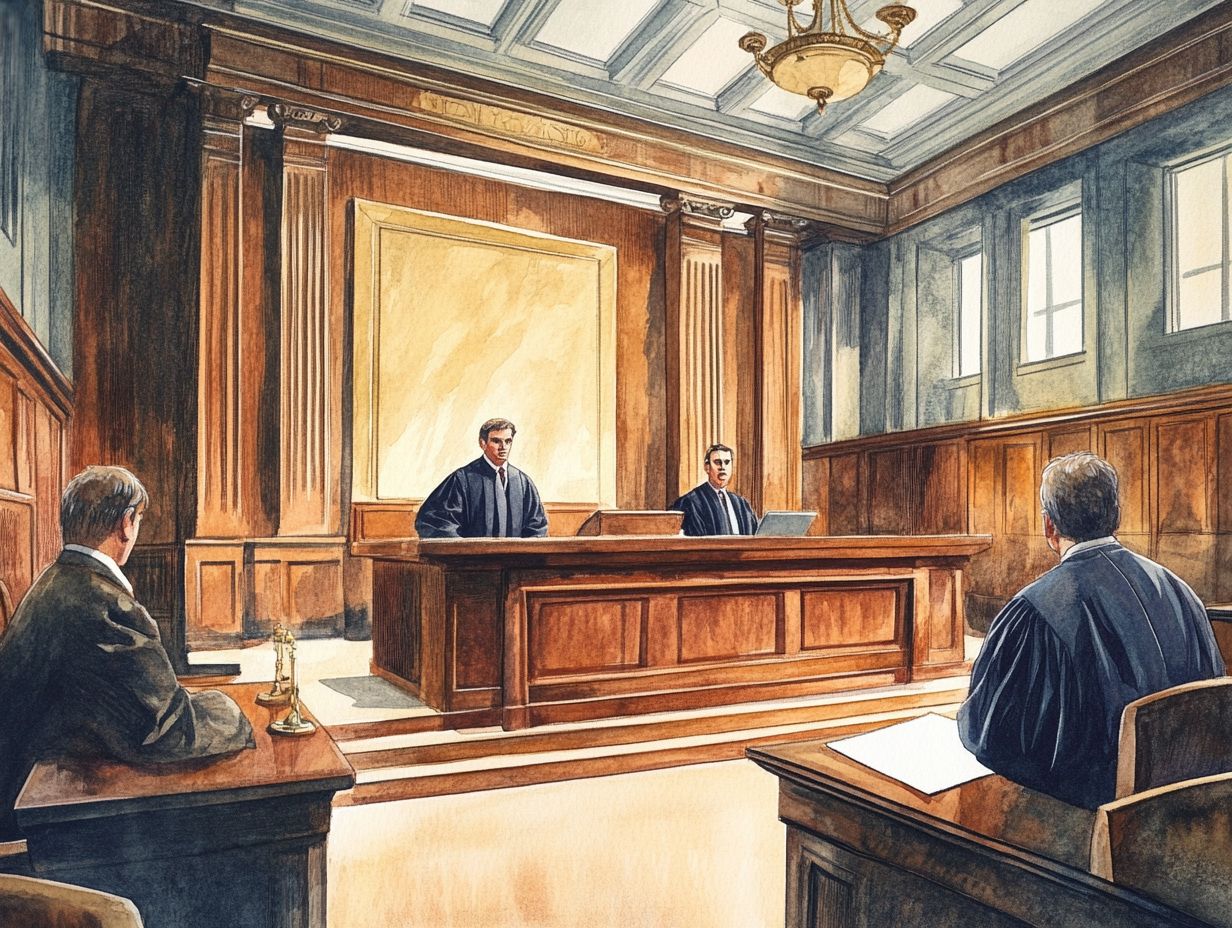
Potential changes to the right to be present at trial could have profound implications for courtroom procedures and the rights of defendants. These alterations might transform how you interact with your legal team and navigate the judicial process.
While these changes may speed up trials, they could also prevent you from being fully involved in your case. On one hand, these modifications may streamline proceedings, leading to quicker resolutions. On the other hand, they risk undermining the core principle of a fair trial, potentially leaving you feeling disconnected from decisions that significantly impact your life.
As the legal landscape evolves, it’s essential to explore both the anticipated benefits and drawbacks in depth. This ongoing dialogue will ultimately shape how individuals like you perceive trial rights and influence broader judicial practices in a rapidly changing social environment.
Frequently Asked Questions
What is the right to be present at your trial?
The right to be present at your trial is a fundamental right guaranteed by the Sixth Amendment of the United States Constitution. It gives the accused the right to a fair trial by ensuring they are physically present during their trial proceedings.
Why is the right to be present at your trial important?
The right to be present at your trial is important because it allows the accused to directly observe the evidence being presented against them, participate in their defense, and confront witnesses. Additionally, it’s crucial to understand your rights in pre-trial procedures to ensure a fair trial.
Is the right to be present at your trial absolute?
Understanding your rights in the courtroom is crucial. If you have any questions or concerns, don’t hesitate to reach out to a legal professional for guidance.
No, the right to be present at your trial is not absolute.
Your presence can be limited if you are disruptive or pose a safety threat to the courtroom.
When can my right to be present at my trial be given up?
You can give up your right if you choose not to attend or cannot make it due to illness or other valid reasons.
Can my lawyer represent me at trial if I am not there?
No, your lawyer cannot represent you unless you are present. You need to be there to confront witnesses and take part in your defense.
What should I do if I am denied the right to be present at my trial?
If you think your right to be present is being violated, contact your lawyer right away! They can help protect your rights.
